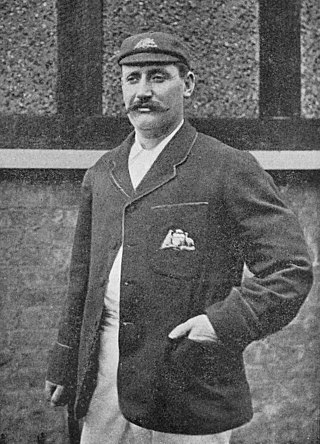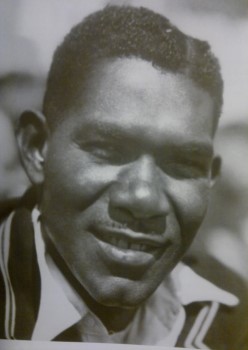Related Research Articles

Bodyline, also known as fast leg theory bowling, was a cricketing tactic devised by the English cricket team for their 1932–33 Ashes tour of Australia. It was designed to combat the extraordinary batting skill of Australia's leading batsman, Don Bradman. A bodyline delivery was one in which the cricket ball was bowled at pace, aimed at the body of the batsman in the expectation that when he defended himself with his bat, a resulting deflection could be caught by one of several fielders deliberately placed nearby on the leg side.

Warwick Windridge Armstrong was an Australian cricketer who played 50 Test matches between 1902 and 1921. An all-rounder, he captained Australia in ten Test matches between 1920 and 1921, and was undefeated, winning eight Tests and drawing two. Armstrong was captain of the 1920–21 Australian team which defeated the touring English 5–0: one of only three teams to win an Ashes series in a whitewash. In a Test career interrupted by the First World War, he scored 2,863 runs at an average of 38.68, including six centuries, and took 87 wickets. He was inducted into the Australian Cricket Hall of Fame in 2000.

Learie Nicholas Constantine, Baron Constantine was a Trinidadian cricketer, lawyer and politician who served as Trinidad and Tobago's High Commissioner to the United Kingdom and became the UK's first black peer. He played 18 Test matches for the West Indies before the Second World War and took the team's first wicket in Test cricket. An advocate against racial discrimination, in later life he was influential in the passing of the 1965 Race Relations Act in Britain. He was knighted in 1962 and made a life peer in 1969.

George Henry Stevens Trott was an Australian cricketer who played 24 Test matches as an all-rounder between 1888 and 1898. Although Trott was a versatile batsman, spin bowler and outstanding fielder, "it is as a captain that he is best remembered, an understanding judge of human nature". After a period of some instability and ill discipline in Australian cricket, he was the first in a succession of assertive Australian captains that included Joe Darling, Monty Noble and Clem Hill, who restored the prestige of the Test team. Respected by teammates and opponents alike for his cricketing judgement, Trott was quick to pick up a weakness in opponents. A right-handed batsman, he was known for his sound defence and vigorous hitting. His slow leg-spin bowling was often able to deceive batsmen through subtle variations of pace and flight, but allowed opposition batsmen to score quickly.

Vijay Singh Madhavji Merchant, was an Indian cricketer. A right-hand batsman and occasional right-arm medium pace bowler, Merchant played first-class cricket for Bombay cricket team as well as 10 Test matches for India between 1929 and 1951. Behind his limited Test appearances, he dominated Indian domestic cricket – his batting average of 71.64 is the second highest first-class average in history, behind only that of Don Bradman. He is regarded as the founder of the Bombay School of Batsmanship, that placed more importance on right technique, steely temperament, and conservative approach rather than free flow of the bat.
This is a bibliography of literary and historical works about cricket. The list is sorted by author's name. It is inevitably highly selective. The 1984 edition of E. W. Padwick's A Bibliography of Cricket had more than 10,000 entries.
The Cricket Society is a charitable organisation founded in 1945 as the Society of Cricket Statisticians at Great Scotland Yard, London. It has grown steadily to be the largest body of its kind in the cricket world. The Cricket Society now has over 1,500 members in the United Kingdom and the cricket playing countries of the world. Its current President is John Barclay.

Leslie George Hylton was a Jamaican cricketer, a right-arm bowler and useful lower-order batsman who played in six Test matches for the West Indies between 1935 and 1939. In May 1955 he was hanged for the murder of his wife, whom he had shot in a jealous rage a year earlier.
Gideon Clifford Jeffrey Davidson Haigh is a British-born Australian journalist and non-fiction author who writes about sport, business and crime in Australia. He was born in London, was raised in Geelong, and lives in Melbourne.

Samuel John Everett Loxton was an Australian cricketer, footballer and politician. Among these three pursuits, his greatest achievements were attained on the cricket field; he played in 12 Tests for Australia from 1948 to 1951. A right-handed all-rounder, Loxton was part of Don Bradman's Invincibles, who went through the 1948 tour of England undefeated, an unprecedented achievement that has never been matched. As well as being a hard-hitting middle-order batsman, Loxton was a right-arm fast-medium swing bowler who liked to aim at the upper bodies of the opposition, and an outfielder with an accurate and powerful throw. After being dropped from the national team, Loxton represented Victoria for seven more seasons before retiring from first-class cricket. He served as an administrator after his playing days were over and spent 24 years as a Liberal Party member of the Victorian Legislative Assembly. Up until 1946, Loxton also played in the Victorian Football League (VFL) for St Kilda as a forward. In all three arenas, he was known for his energetic approach.

Wilton H. St Hill was a West Indian international cricketer who played in West Indies' first Test match during their inaugural Test tour of England. A right-handed batman who played in a variety of batting positions, he represented Trinidad in first-class cricket between 1912 and 1930 and played in three Test matches in total. Although his Test record was poor, he was highly regarded in Trinidad. In particular, writer C. L. R. James considered St Hill to be among the top batsmen in the world and dedicated a chapter of Beyond a Boundary to him. At the peak of his career, Lord Harris described him as the best batsman in the West Indies.

Emmanuel Alfred Martindale was a West Indian cricketer who played in ten Test matches from 1933 to 1939. He was a right-arm fast bowler with a long run up; although not tall for a bowler of his type he bowled at a fast pace. With Learie Constantine, Martindale was one of the earliest in the long succession of Test-playing West Indian fast bowlers. During the time he played, the West Indies bowling attack depended largely on his success. Critics believe that his record and performances stand comparison with bowlers of greater reputation and longer careers.
Gerald Howat, born Gerald Malcolm David Howat, was a British writer on cricket, a historian and a schoolmaster.
Keith Ormond Edley Johnson, was an Australian cricket administrator. He was the manager of the Australian Services cricket team in England, India and Australia immediately after World War II, and of the Australian team that toured England in 1948. The 1948 Australian cricket team earned the sobriquet The Invincibles by being the first side to complete a tour of England without losing a single match.

Victor Thomas Trumper was an Australian cricketer known as the most stylish and versatile batsman of the Golden Age of cricket, capable of playing match-winning innings on wet wickets his contemporaries found unplayable. English cricket captain Archie MacLaren said of him, "Compared to Victor I was a cab-horse to a Derby winner". Trumper was also a key figure in the foundation of rugby league in Australia. His photograph taken by George Beldam in 1905 is often considered to be the greatest cricketing photograph ever taken.
Rahul Bhattacharya is an Indian journalist and novelist. He currently resides in New Delhi.

Home Fire (2017) is the seventh novel by Kamila Shamsie. It reimagines Sophocles's play Antigone unfolding among British Muslims. The novel follows the Pasha family: twin siblings Aneeka and Parvaiz and their older sister Isma, who has raised them in the years since the death of their mother; their jihadi father, whom the twins never knew, is also dead. Parvaiz attempts to follow in his father's footsteps by joining ISIS in Syria. He soon decides he has made a serious mistake and his twin sister attempts to help him return to Britain, in part through her romantic relationship with Eamonn Lone, son of British Home Secretary Karamat Lone, who has built his political career on his rejection of his own Muslim background. The effort to bring Parvaiz home fails when he is shot to death trying to escape ISIS, then Eamonn and Aneeka, trying to return Parvaiz's body to the UK over the objections of Karamat Lone, die in a terrorist attack.

Saint Clair is a business and residential district between the Queen's Park Savannah and the Maraval River in Port of Spain, Trinidad and Tobago. It is home to most of the city's grandest and largest mansions and also home to the Magnificent Seven Houses. Federation Park and Ellerslie Park. St Clair is one of Port of Spain's five police districts.

A Corner of a Foreign Field: The Indian History of a British Sport is a 2002 book by Indian historian Ramachandra Guha that offers a historical account of cricket in the Indian subcontinent. Some critics have called it one of the finest books on cricket.
Christopher Sandford is an English journalist and biographer. He primarily writes about film and music, as well as cricket, his sport of preference.
References
- ↑ "The Cricket Society/MCC Book of the Year". The Cricket Society. Archived from the original on 15 April 2019. Retrieved 9 July 2018.
- ↑ Gideon Haigh, "Cricket Books, 2010", Wisden 2011, p. 122.
- ↑ Kamila Shamsie, "Cricket Books in 2017", Wisden 2018, p. 129.
- ↑ "Harry Pearson". David Higham. Retrieved 10 July 2018.
- ↑ "Harry Pearson". When Saturday Comes. Retrieved 10 July 2018.